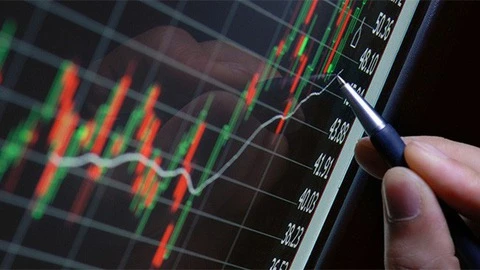
Domestic investors dominate
After suddenly increasing sharply in April, the movement of the stock market in May and in the early sessions of June continued to show great promise. Even the increase in the VN Index was better than in some regional markets such as Thailand, China and South Korea. The positive movement of the stock market not only reflected on HOSE, but also on the index of HNX and UPCoM, that increased by 2.8% and 5.4%, together with high liquidity in May. The market value was measured by the average daily trading value in recent sessions that reached VND 7,000 bn, sometimes even more than VND 8,200 bn.
Foreign traders after strongly net-selling in the first months of the year traded more actively. Foreign investors have actively restructured their portfolios when combining both selling and buying activities in this period, helping the market reduce pressure compared to the last two months. The most positive move by foreign investors was probably continuous spending on new domestic ETFs, such as FUEVFVND that simulated the VN Diamond index; and FUESSVFL that simulated the VN Fin Lead index.
According to statistics of Rong Viet Securities (VDSC), FUEVFVND and FUESSVFL ETF have issued new VND 47.8 mn and VND 20.5 mn fund certificates, respectively, equivalent to VND 780 bn in May. However, FUESVFVND ETF has proved its attraction even though it only listed in mid-May, while FUESSVFL ETF has partly attracted foreign investors after two months of listing. Another positive point is that the worry about the largest domestic ETF in the market E1VFVN30 ETF, may be withdrawn by investors to switch to new internal ETFs, which was partially removed when this ETF issued new and redeemed fund certificates in this period.
It can be said that the stock market increased stronger than expected thanks to the strong participation of domestic investors, as well as a decrease in the net selling pressure from foreign investors. The proportion of transactions of domestic and foreign individual investors reached 77% and 15% in May, respectively, compared to the average of 72% and 17% previously. According to statistics, since the beginning of 2020, there have been 128,347 new personal accounts, bringing the total number of individual investors to nearly 2.5 million.
According to securities experts, the active participation of domestic investors is due to the positive progress of disease control and the great support from loosening of monetary policy by the State Bank of Vietnam (SBV), in particular during the period of low capital demand in the economy due to stagnant production activities. Specifically, at the beginning of May, the State Bank lowered the key interest rate by 50 points, and the ceiling deposit rate for terms of less than six months also decreased from 4.75% to 4.25%. Decreased deposit rates have increased the attraction towards the stock market. Margin lending interest rates of securities companies also have more incentive packages, especially for newly opened accounts. It is estimated that the current margin balance has increased by about 15% compared to the beginning of May.
Meanwhile, the demand from foreign investors mainly comes from the new ETFs, partly solving the current problem of foreign ownership limits. Particularly, FUEVFVND showed attraction after listing, when the asset size of this fund increased seven times compared to the time of IPO, to current VND 725 bn. Now the total assets of FUEVFVND are only equal to 12% of the total assets of E1VFVN30 fund. However, FUESSVFL fund has started attracting investors after two months of listing when the total assets of this fund doubled in May, to VND 451 bn.
Potential risk in short term
Although the buying power of domestic investors is still very strong, the cash flow from these investors shows more selective buying and selling, since this group rotated net buying in May, instead of buying completely in previous months. Statistics show that the number of new accounts opened in May have started to slow down.
Basically, the market is proving to be more expensive compared to the beginning of the year, when the estimated basic profit per share (EPS) in 2020 adjusted down to 4%, instead of increasing by 12% at the beginning of the year. In addition, the market has recovered 30% since touching bottom in March and the stock price is no longer attractive, as there are many risk investors. These risks are mainly from the outside, which have not directly affected the economic activities in Vietnam, but may dominate the psychology of investors. The complicated development of the political situation in the world, and the US-China trade tensions are showing signs of escalating once again, with racist protests spreading across the US states and European countries, that are all having a strong effect on investors.
According to Mr. Phan Dung Khanh, Director of Investment Consulting of Maybank Kim Eng Securities (MBKE), cash flow in the stock market and risky assets derived from individual investors are the main support for the market. Meanwhile, large investors continuously withdrew cash, or moved to safer assets like gold or government bonds. As a result, the stock market valuation is getting higher with P/E (stock price increase), while businesses are getting increasingly difficult (EPS decline). The stock market going against the economy took place in a long time at high speed, which is a big risk for short-term investors.
The HNX Index has tended to go in the opposite direction from the VN Index recently, which is also a warning, as HNX Index decreases when the VN Index increases and vice versa. Therefore, investors can be happy if they earn money, though not too happy, because when the market turns bad again, cash flow is no longer enough to support the market.




















